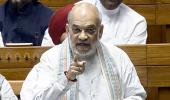'It is not as if Hindus are not being touched at all, and only Muslims are.'

After the Lok Sabha passed the Waqf (Amendment) Bill by a 288-232 vote in the early hours of Thursday following 12 hours of debate, Union Minority Affairs Minister Kiren Rijiju tabled the Bill in the Rajya Sabha.
The Upper House, with all constituents of the ruling National Democratic Alliance backing the Bill, was expected to pass the proposed law after another marathon debate.
Sources in the Opposition said they were hopeful of getting at least a hundred members of parties unaffiliated to the NDA or the Indian National Developmental Inclusive Alliance (INDIA) bloc, such as the Biju Janata Dal (BJD) and the YSR Congress Party, to oppose the Bill.
However, the BJD, which had earlier conveyed to Opposition parties that it would oppose the Bill, announced on Thursday that it has allowed its members to 'exercise their conscience' during the vote in the Rajya Sabha, and opted to not issue a whip.
Tabling the Bill in the Rajya Sabha, Rijiju listed the amendments that the government has brought in the redrafted Bill.
These include keeping protected monuments outside the ambit of Waqf, protecting the Fifth and Sixth Schedule Areas of the Constitution and changing the provisions related to the number of members of tribunals, as suggested by the joint committee of Parliament, to be set up under the proposed law.
Rijiju said that only a Muslim can become a 'Waqif' and that the question of the majority of members on the Central Waqf Council being non-Muslims does not arise.
The minister said the proposed legislation has nothing to do with religion, but deals only with properties. The minister informed the House that there were 490,000 lakh Waqf properties in 2004, which have now increased to 872,000.
The minister said properties already registered with proper documentation will not be dealt with retrospectively, but it would be with a prospective effect.
"However, if there is any disputed land or any matter that is sub judice, then we cannot do away with the right of the courts.
"So all the Waqf properties which are registered with proper documentation, will remain so," Rijiju said.
Some members of the Opposition in the Rajya Sabha were wearing black as a mark of protest against the Bill.
The Congress' Naseer Hussain, the lead speaker for his party, said the BJP supported the Waqf Bills in 1995 and 2013, and has brought the new Bill since it was reduced to 240 seats in the 2024 Lok Sabha polls and this is its renewed effort at communal polarisation.
He asked if the BJP is so interested in the welfare of poorer sections of Muslims why is it that Waqf Boards in BJP-run states have not been constituted for several years.
Hussain decried the way the JPC on the issue functioned, alleging that it sought views of people who were not stakeholders in the process because all the stakeholders that appeared before the parliamentary committee opposed the provisions of the proposed Bill.
He said the Bill is a "targeted and unfair legislation" against Muslims and an effort to make them "second-class citizens".
On the provision that only a practising Muslim of five years could donate, Hussain wondered how it would be ensured.
"Would you open a department to identify such Muslims?" he asked, and alleged that the intent was to eye the land, which would be handed over to the private sector.
He said trusts of no other religion had members from other communities, such as those of Hindus and Sikhs, and allowing non-Muslims to become members of Waqf Boards was against the community's Constitutional rights.
In her speech on the Bill, Finance Minister Nirmala Sitharaman said that in Tamil Nadu, the Hindu Religious and Charitable Endowments (HR & CE) department is with the state government.
Government-appointed people monitor it, they execute it and they run it, she said.
In the Tirumala Tirupati Devasthanam, the executive officer is appointed by the government of Andhra Pradesh.
"The Endowment Board has people appointed by the Andhra Pradesh government and the entire system is under the government of Andhra Pradesh.
"So, it is not as if Hindus are not being touched at all, and only Muslims are," she said.
Earlier, the Congress' Hussain had said that trusts of Hindus had only Hindu members, as was the case with Sikhs and others, but the government was making an exception in the case of Waqf Boards.
Sitharaman, a Rajya Sabha member representing Karnataka, said, "A lot of Hindu pilgrims have started feeling that only their temples are being completely controlled by government and government-appointed men.
"It is leading to a lot of confusion among Hindu pilgrims and it is a matter of concern for all religions."
Feature Presentation: Ashish Narsale/Rediff.com












 © 2025
© 2025